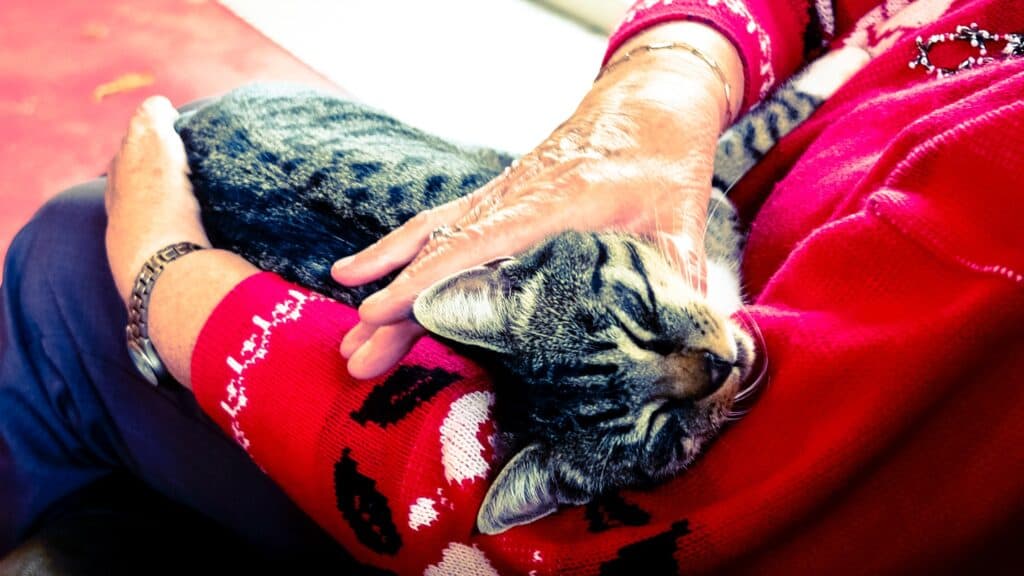How to Care for a Senior Cat
Posted by Lora Shaw on June 9, 2023

It is common to wonder how to properly care for a senior cat as your furry friend starts to age. While each cat is different, it is important to follow some sort of care regimen to keep them comfortable and healthy.
Learn about some of our tips for caring for a senior cat in this post, as well as signs that your cat is starting its senior phase.
Signs You Need Extra Care for Your Senior Cat
Thanks to improved nutrition and indoor living, the lifespan of cats is now extended. A healthy cat might live into its twenties and be considered older between ages 12-14. With this in mind, it is important to note that caring for a senior cat will not differ much from caring for your cat as you have in the past; instead, it may just require few alterations to care and routines.
If you are unsure if you need to start treating your cat as a senior, there are signs that you can look out for that indicate this next phase of life. When your cat enters its older age, it may begin exhibiting the following:
- Frequent meowing
- Avoiding typical resting places
- Missing the litter box (or not using it at all)
- Not coming when called by name
- Noticeable changes in sleeping or eating patterns
While the signs above are aspects to take note of, be sure to call your vet if you see any other changes in behavior or health that might be considered concerning. Now that you are aware of the signs, let’s dive into some tips on caring for a senior cat.
7 Tips on Caring for a Senior Cat
1. Daily Hair Brushing and Grooming
As we mentioned above, caring for a senior cat will not be much different than your current routines. In fact, some tips you may practice already and just need to do more frequently. Daily hair brushing is one of these routine items that can make a big impact.
Removing loose hair through brushing can help prevent it from being swallowed, reducing hairballs. Using a brush can also promote a healthier skin and coat, as it stimulates blood circulation and sebaceous gland secretions.
2. Nail Trimming
When cats get older, they typically do not use scratching posts as much as they did when they were younger. For this reason, it is important to check their nails weekly to see if they can benefit from a trim. If they look like they could use a trim, you can either try to cut them yourself or plan an appointment at your local pet grooming facility.
3. Tooth Brushing
Brushing your cat’s teeth with pet-friendly toothpaste is the most effective way to prevent dental disease. Maintaining oral health can prevent other issues down the line as well. Most cats will allow you to brush their teeth, but be sure to get them familiar with tooth brushing in advance to prevent them from being startled or uncomfortable.
4. Keeping Up with Other Basics
Constantly providing your cat with easy access to fresh water is vital, as kidney function is known to deteriorate in older cats. Additionally, finding food that accommodates their needs will be important. Sometimes, using a mix of dry and wet food is helpful because it allows your cat to absorb the water found in canned food.
5. Monitoring Well-Being
Due to less exercise, many cats may get heavier or even obese as they age. Be sure to watch their diet and consult a vet who can modify their diet if needed. However, this is not the case for all cats. In fact, some senior cats get too thin as they age. Weight loss may be tied to problems like kidney failure, but a special diet can combat issues like this.
6. Reducing Potential Stresses
Since cats are not easily adaptable to change, it is important to reduce any interruptions in their natural environment and routine. Additionally, introducing your cat to a new pet may be traumatic, so this should be avoided if possible. Another potential stress could be moving to a new space. Ways to alleviate this stress would be to make sure to keep familiar objects around them and giving them more affection and attention.
7. Creating Moments of Quality Time
Last but not least, caring for your senior cat means more than just cleaning them and managing their hygiene. In their advancing years, cats might need more emotional support and become more dependent on relationships. Spending quality time with your furry friend gives them comfort. Any extra TLC they can get will be much appreciated throughout their aging process.
How to Care for Your Senior Cat When You Have a Busy Schedule
Now you might be wondering, “Do the professionals at Pet Palace know how to care for a senior cat?” The answer is: absolutely! We have the staff to make sure your cat receives compassionate and professional attention during their boarding experience. Additionally, we are able to administer medication to ensure their wellness while you’re away!
If your cat doesn’t need boarding and would benefit more from some grooming, we are more than happy to do that as well. Grooming is a great way to make your senior cat look good while contributing to their overall health. Not to mention, it is another effective way of making them feel appreciated and loved!
Related Content on Caring for Cats
Contact Us to Schedule an Appointment!
Now that you are well informed on how to care for a senior cat, we know that you will do whatever you can to make your furry friend comfortable.
If you have any questions about our services or care tips, be sure to reach out to our team of passionate pet lovers!

Categories: Cats, Tips for Your Pets
Archives
Recent Articles
Categories
Monthly Archive
- July 2025
- June 2025
- May 2025
- April 2025
- March 2025
- February 2025
- January 2025
- December 2024
- November 2024
- October 2024
- September 2024
- August 2024
- July 2024
- June 2024
- May 2024
- April 2024
- March 2024
- February 2024
- January 2024
- December 2023
- November 2023
- October 2023
- August 2023
- July 2023
- June 2023
- May 2023
- April 2023
- March 2023
- February 2023
- January 2023
- December 2022
- November 2022
- October 2022
- August 2022
- July 2022
- June 2022
- April 2022
- March 2022
- February 2022
- November 2021
- October 2021
- November 2020
- September 2020
- July 2020
- March 2020
- January 2020
- November 2019
- September 2019
- July 2019
- March 2019
- January 2019
- December 2018
- November 2018
- October 2018
- August 2018
- July 2018
- June 2018
- May 2018
- April 2018
- March 2018
- February 2018
- January 2018
- December 2017
- November 2017
- October 2017
- September 2017
- August 2017
- July 2017
- June 2017
- May 2017
- April 2017
- March 2017
- February 2017
- January 2017
- December 2016
- November 2016
- September 2016
- August 2016
- July 2016
- June 2016
- May 2016
- April 2016
- March 2016
- February 2016
- December 2015
- November 2015
- October 2015
- September 2015
- August 2015
- July 2015
- May 2015
- March 2015
- February 2015
- January 2015
- December 2014
- November 2014
- September 2014
- August 2014
- July 2014
- June 2014
- May 2014
- March 2014
- February 2014
- January 2014
- December 2013
- November 2013
- October 2013
- September 2013
- August 2013
- June 2013
- May 2013
- March 2013
